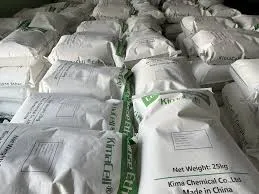
Sep . 28, 2024 15:34 Back to list
MHEC Suppliers for High-Quality Methyl Hydroxyethyl Cellulose Products and Applications
MHEC A Comprehensive Overview of Methyl Hydroxyethyl Cellulose Suppliers
Methyl Hydroxyethyl Cellulose, commonly abbreviated as MHEC, is a versatile and important cellulose derivative widely used in various industries, including construction, pharmaceuticals, food, and personal care. As the demand for MHEC continues to rise, the role of manufacturers in providing high-quality MHEC becomes crucial to meet the specific needs of different applications.
What is MHEC?
MHEC is a non-ionic, water-soluble polymer that is derived from natural cellulose. Its chemical structure is modified through a process involving methylation and hydroxyethylation. This modification allows MHEC to possess unique properties, such as excellent thickening, binding, and film-forming capabilities, making it a preferred choice in many formulations. Due to its high viscosity and water-retention properties, MHEC finds widespread use in cement-based materials, adhesives, and various aqueous solutions.
Applications of MHEC
1. Construction Industry MHEC is most commonly used in cement-based products as it improves workability, prolongs open time, and aids in water retention. It is an essential ingredient in tile adhesives, renderings, and other construction mortars. The addition of MHEC enhances the performance of these materials, ensuring better adhesion and reduced cracking.
2. Pharmaceuticals The pharmaceutical sector utilizes MHEC as a thickener and stabilizer in liquid formulations, such as syrups and suspensions. Its ability to enhance viscosity enables a more uniform distribution of active ingredients, providing improved therapeutic efficacy.
3. Food Industry In the food industry, MHEC serves as a thickening agent and stabilizer in various products, including sauces, dressings, and dairy applications. It contributes to texture, mouthfeel, and overall product stability, making it a valuable component for food manufacturers looking to enhance their product quality.
4. Personal Care Products The cosmetic and personal care industries employ MHEC as a thickening agent in lotions, creams, and gels. Its ability to improve texture and retain moisture makes it a suitable choice for enhancing the performance of skin care and hair care products.
mhec-methhyl hydroxyethyl cellulose manufacturer

Choosing the Right MHEC Manufacturer
With the growing application areas and demand for MHEC, selecting a reliable manufacturer becomes critical. Here are several factors to consider when sourcing MHEC
1. Quality Control It is essential to partner with manufacturers who prioritize stringent quality control measures. High-quality raw materials and consistent production processes lead to products that meet industry standards and customer expectations.
2. Technical Expertise Look for manufacturers with a strong technical background in cellulose derivatives. A knowledgeable partner can provide expert guidance on formulation and application, helping companies maximize the performance of their products.
3. Customization Different applications may require specific grades of MHEC, including variations in viscosity and molecular weight. A proficient manufacturer will offer customized solutions tailored to meet your unique requirements.
4. Sustainability In today’s market, sustainability is a growing concern. Opting for manufacturers who emphasize sustainable practices, such as using renewable resources and eco-friendly processing methods, can contribute positively to your brand image.
5. Customer Support Strong customer support and responsive service can help clients navigate challenges and optimize the use of MHEC in their formulations. A partner that offers technical assistance, product training, and responsive communication will enhance the overall collaboration experience.
Conclusion
Methyl Hydroxyethyl Cellulose is an indispensable ingredient in multiple industries due to its unique properties and versatility. As the demand for MHEC continues to expand, working with the right manufacturer is vital to ensure product quality, consistency, and support. By considering factors such as quality control, technical expertise, customization options, sustainability practices, and customer support, companies can effectively navigate the supplier landscape to find a partner that meets their specific needs. As industries evolve and innovate, the role of MHEC will likely continue to grow, underscoring the importance of selecting a reliable manufacturer for this essential cellulose derivative.
-
Versatile Hpmc Uses in Different Industries
NewsJun.19,2025
-
Redispersible Powder's Role in Enhancing Durability of Construction Products
NewsJun.19,2025
-
Hydroxyethyl Cellulose Applications Driving Green Industrial Processes
NewsJun.19,2025
-
Exploring Different Redispersible Polymer Powder
NewsJun.19,2025
-
Choosing the Right Mortar Bonding Agent
NewsJun.19,2025
-
Applications and Significance of China Hpmc in Modern Industries
NewsJun.19,2025







